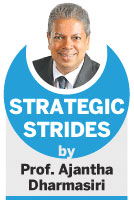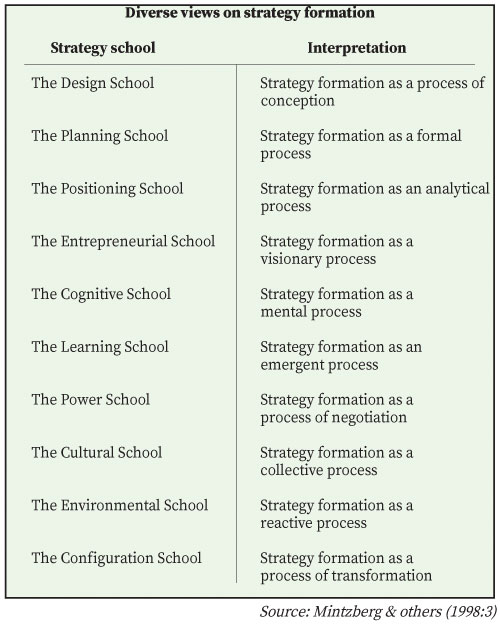This is the newest column I am delighted to develop. It is all about strategy. Stride is a walk with long, decisive steps in a specified direction. That’s what we will deliberate from this Sunday. As an organisation as well as a nation, we need to strategise with future success in mind.
 As Eleanor Roosevelt said, “The future belongs to those who believe in the beauty of their dreams.” This column is an invitation to dream vividly and to deliver value in making the dream a reality.
As Eleanor Roosevelt said, “The future belongs to those who believe in the beauty of their dreams.” This column is an invitation to dream vividly and to deliver value in making the dream a reality.
Strategy is often a confusingly used term that may mean different things to people. I have seen this happening in Sri Lanka, where crafting and executing strategy is cluttered by a myriad of slogans. We need clarity and commitment towards formulating and implementing strategy at corporate level as well as at country level. It is people who design and deliver in driving results. To recover economic growth through a multi-sectoral approach with professionalism in action is a timely need for Sri Lanka.
‘Strategy Beast’
“It seems that we are over-led and under-managed,” says Mintzberg. Many may disagree. Yet, you cannot undermine this candid Canadian veteran. Having contributed to management in proposing ten key managerial roles way back in 1971, he is sharp and sensible in his criticism.
Mintzberg cites a poem written by John Godfrey Saxe (1816-1887) highlighting the possible confusions towards strategy.
It was six men of Indostan
To learning much inclined,
Who went to see the Elephant
(Though all of them were blind)
That each by observation might satisfy his mind.
In essence, each of the blind men interpreted the elephant based on the part each one touched. The one who touched the tail thought that the “elephant is like a rope”.
And so these men of Indostan
Disputed loud and long,
Each of his own opinion
Exceeding stiff and strong,
Though each was partly in the right,
And all were in the wrong!
“We are the blind people and strategy formation is our elephant”, says Mintzberg. “One has grabbed hold of some part or other and “railed on in utter ignorance” about the rest. We certainly do not get an elephant by adding up its parts. An elephant is more than that. Yet to comprehend the whole we also need to understand the parts.”
It is obvious that being strategic is of utmost importance in the business context. It essentially shows how ‘smart’ you are in ‘playing the game’. The roots are from the Greek word strategios, which means the art of the General. Obviously, it has a military connotation as to how a general orders the troops to attack, or to withdraw or to surround the enemy, with the aim of winning the war in the mind. A battlefront and a business front have a lot in common, particularly with the sky-rocketing competition, globally as well as locally. Mintzberg and his co-authors have attempted to draw a parallel between the six blind men and ten approaches to strategy. According to them, none of them is absolutely right or wrong, but each lacks the holistic perspective.
The table captures the essence of such ten schools of thought.
The table amply shows the diversity in the approaches with inevitable strengths and shortcomings. They all speak of strategy either as a plan, pattern, position, perspective or a ploy. Interestingly, though not popular, Five Ps of strategy can be identified in this sense.
Do we see the presence of the above approaches in Sri Lanka? In both private and public sectors alike, a strategic plan or a corporate plan (both are interchangeably used to mean the same thing) is considered essential. A multi-coloured spiral-bound thick report is prepared and presented and perhaps that is the end of the story. Whether there is a serious emphasis on achieving the formulated plan is questionable. This is more prevalent in the public sector where the annual audits would check the availability of a strategic plan as a check list item and the implications beyond them is hardly investigated.
Helm
I recall the statement by the Malaysian High Commissioner in Sri Lanka at the Fire Side Chat with leading foreign envoys in Colombo recently. He referred to the consistent tourism strategy adopted by Malaysia with one solid slogan for the past twenty-five years. ‘Malaysia Truly Asia’.
We, in contrast, have changed our slogan almost every year based on the likes and dislikes of those at the helm. A lot of food for thought with regard to consistency and continuity. Sri Lanka as a nation should move ahead with a vision towards prosperity. The so-called ‘Vision 2025’ of being a ‘country enriched’ stated, “we will do so by transforming Sri Lanka into the hub of the Indian Ocean, with a knowledge-based, highly competitive, social-market economy”.
The execution of it has been obviously questionable. Now, we have a fresh window of opportunity to dream and deliver. With the right leadership at the helm, what requires essentially is collaboration of all in being coherent. It reminds me of what Joel Barker said, “Vision without action is a day dream. Action without vision just passes by. Vision with action will create the desired future.”

